Liaison quits KSA over social justice spending decision
October 20, 2009 by Mitch Thompson · 4 Comments
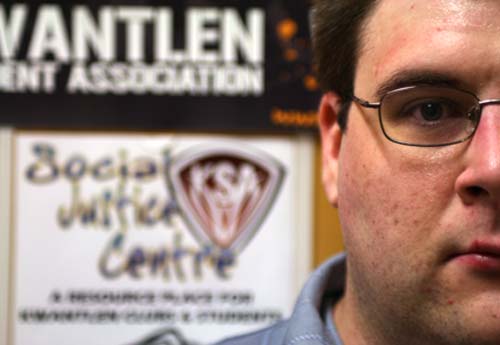
Ken McIntyre has resigned as a student liaison after a KSA decision over an referendum-approved charge for a Social Justice fund. (Mitch Thompson photo)
Student liaison Ken McIntyre has resigned from his position on the Kwantlen Student Association council to protest the handling of a referendum-approved 10-cents-a-credit fee to fund the Social Justice Centre.
McIntyre, who had been the liaison to the KSA for students with disabilities, one of seven positions that focus on social justice issues at the university, resigned Oct. 6 after the KSA voted to remove the 10-cent-a-credit fee from Social Justice and increase the KSA’s building fee from 25 cents a credit to 35 cents.
The social justice fee was approved in the September referendum and would have been used to fund the liaisons and their Social Justice Centre, rather than having their budget come from KSA operating funds.
Derek Robertson, director of external affairs, made the motion to remove the Social Justice fee and increase the student union building fee instead.
“His rationale was that we still had a budget for the previous year, even though it was taken out of the KSA operating expenses,†said McIntyre.
Because of the KSA’s self-imposed student-fee-increase limit of 15 per cent (or $1.56 for next year) a year, the KSA council would be unable to introduce the social justice fee as well as raise the building fee.
McIntyre fears that removing the fee would mean there is no guarantee that social justice will receive adequate funding next year.
“Any other proposal that was put forward by myself or somebody else was, basically, swiftly voted down by [Robertson] and the council,†he said.
The motion was passed and McIntyre decided to leave the KSA in protest. “[Social justice is] more or less one of their bottom issues that they pay lip service to,†he said.
A representative for the KSA said priorizing played an important role in the choosing of which of the fees approved by students would be implemented.
“When we put these questions forward, we didn’t think they would all pass,†said Nathan Griffiths, director of operations.
All of the fees, save one CFS-related one, were passed, and the KSA was faced with the problem of deciding who receives money first while staying under the 15 per cent cap on student fee increases.
“Largely, more people voted for the student union building than people voted for social justice,†Griffiths said.
The referendum results released by the KSA show 58.5 per cent of voters were in favour of the student union building fee and 52.6 per cent of voters were in favour of the social justice fee.
One of the considerations for the KSA is the large mortgage on Surrey campus’s G-building.
The building — which currently houses the KSA, the gymnasium and Grassroots café, other facilities and classroomsz — was built in the 1990s. The provincial government had refused to pay for anything that wasn’t a classroom, so the KSA held a referendum and raised the $1.8 million dollars needed for the other rooms.
The KSA has been paying a sizable mortgage since, and needs to pay it off before it can begin constructing a new student union building.
“We’ve got to pay the mortgage,†said Griffiths. “I don’t think we’d look bad for paying the mortgage.â€
Robertson echoed Griffiths’ position, saying that he felt it would be better to pay off the mortgage more quickly, rather than having the 10 cents a credit go to social justice.
“This was not an attack on our liaisons. This was not an attack on social justice at Kwantlen,†he said. “The whole argument that the KSA is underfunding liaisons is just not true.â€
Robertson said that the KSA provides funding for social justice but sees little of that money being used. “Every single year, the KSA puts money towards the Social Justice Centre and liaisons, and every single year a majority of it is not spent,†he said.
For Griffiths, this is enough to make him reconsider sending more money to social justice. “More money doesn’t necessarily equal more social justice,†he said.
McIntyre explained the lack of spending is a result of the culture towards social justice within the student association. He said that the unused funds come from vacant liaison positions or are the result of provisions that state only a certain percentage of money can be spent at one time.
He also said that many liaisons don’t focus on large scale, high-expense events, as “the amount of money that’s available, with the lack of cooperation and manpower from the rest of the society, sometimes doesn’t make it worth doing.â€
According to McIntyre, indifference towards social justice extends past a lack of funding and into where the liaisons actually work.
The possibility of turning the Social Justice Centre into extra office space for KSA staff, and instead issuing liaisons low-end laptops on which to work, has been discussed among members. The belief was that since the liaisons are multi-campus positions, making their workplace mobile was a natural step.
McIntyre countered however, saying that the KSA executive are technically multi-campus positions as well, but receive both office space and laptops.
“It’s adding insult to injury, as far as I’m concerned,†he said.
“I still believe that the student association is good for the students at Kwantlen,†said McIntyre. “As far as social justice issues, I have lost faith in the student association to make any headway.â€
Robertson said that he will fight to make sure social justice gets the same funding as last year, but McIntyre wasn’t impressed.
“Guaranteeing funding for the amount of money we got last year is a good first step,†he said. “But, at the same time, if you take a look at other students unions, and what they have for social justice, it’s going to take more than just an empty promise.â€
Green-thumbed students give back through toil and soil
October 8, 2009 by Mitch Thompson · 4 Comments
Taking inspiration from the popular show “Extreme Makeover: Home Edition,” Kwantlen Horticulture students remodeled the yards of a deserving Coquitlam family, the Yules. The students were just one part of the renovations, with a group called the Home Team completely remodeling the inside of the house.
This is the third year that the department has partnered with the Home Team. See the full story in Abby Wiseman’s article, which follows the photos.
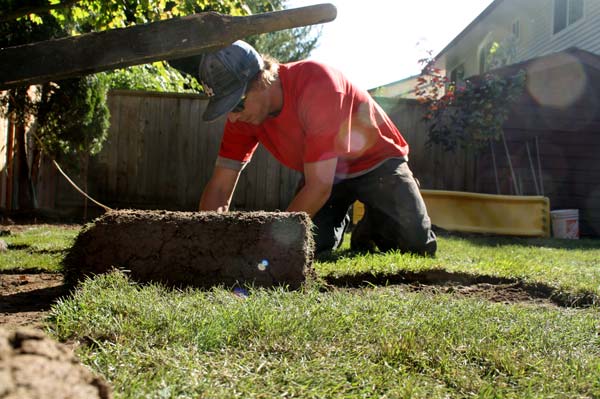
Jared White puts down a piece of sod in the backyard. Sod is a strip of grass and soil used to quickly create lawns. (Mitch Thompson photo)
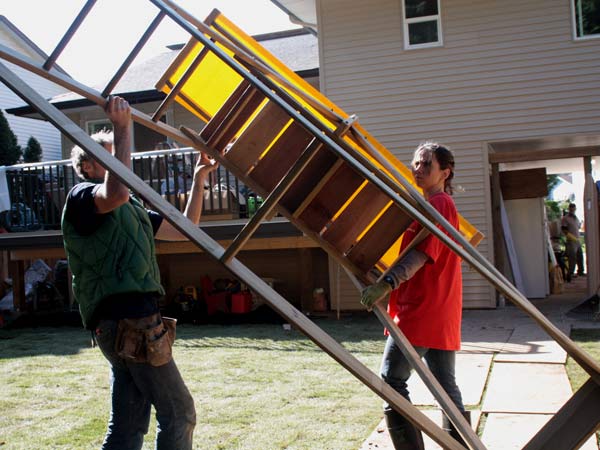
Emily Balzer and Sam Keefer carry in a piece of the new swing set. (Mitch Thompson photo)
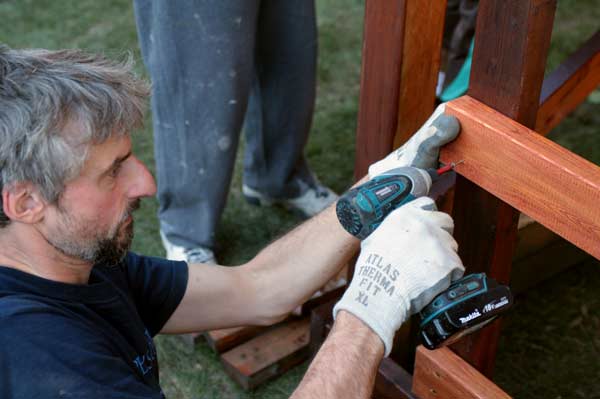
Keefer secures the ladder that will lead up to a new wooden playhouse for the children. The house was donated to the family by the Vancouver Golf Club. (Mitch Thompson photo)
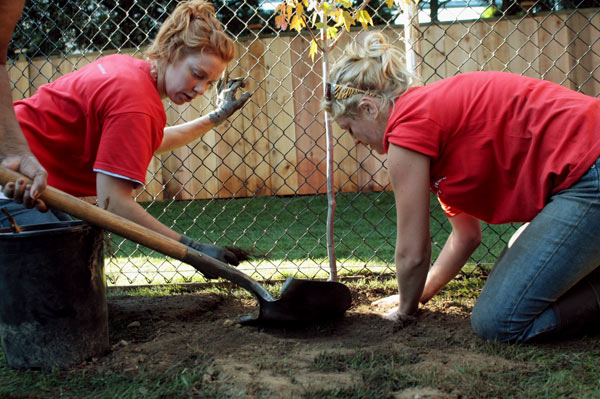
With barely half an hour to go before the reveal, Alyssa Chuback and Kasia Kilner quickly plant one of two new trees for the backyard. (Mitch Thompson photo)
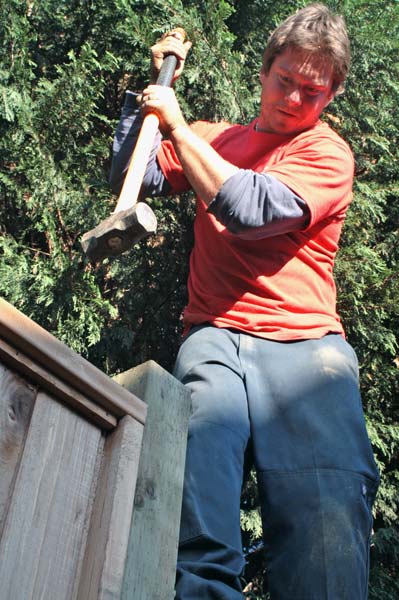
Adam Graham lends a hand to the carpenter by hammering the final section of fence into place. (Mitch Thompson photo)
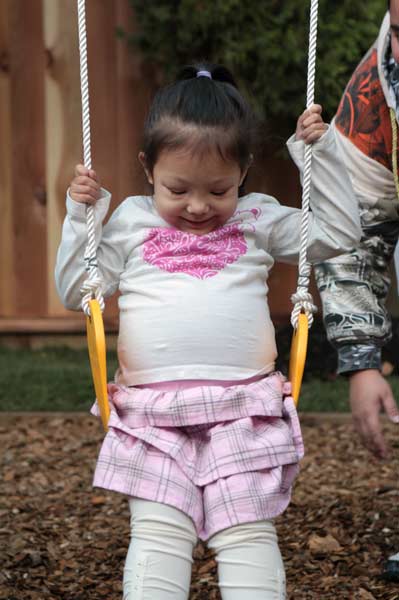
The littlest Yule takes her first ride on her new swing set. The entire family was stunned by the work of the Kwantlen Horticulture students. (Mitch Thompson photo)
By Abby Wiseman
Kwantlen horticulture students got the opportunity to get out of the classroom and put their lessons to practical use last weekend.
While Cornerstone Community Church members were renovating the home of the Yule family in Coquitlam, Kwantlen’s students designed and landscaped the backyard.
This is the third year Kwantlen students have worked with the church and the second time student Alyssa Chuback has been part of the church’s Home Team project.
“Giving back to someone who has given a lot is very rewarding, and it makes you feel good about yourself,†Chuback said.
Stan Kazymerchyk, turfgrass management instructor, feels the project is good for the students, who not only get to put their knowledge to practical use, but also get a rewarding experience, saying the students learn how “to help people, how to be people.â€
The 13 students worked for two days to create a yard for the Yule family. Sunday the renovated house and yard was revealed to the family.
Homeowner Brian Yule was overwhelmed by the changes, saying that he was lost for words.
“Thank you all so much. Beautiful people, beautiful people,†Yule said.
Kazymerchyk hopes to continue getting his students involved in The Home Project for years to come.
“It would be tough to turn down,†Kazymerchyk said.
Each year, the church chooses a family in need and carries out a complete home renovation.
East meets west in new degree
September 29, 2009 by Mitch Thompson · Leave a Comment
A new bachelors degree program at Kwantlen could have students looking distinctly eastward for inspiration.
History professor Frank Abbott attended the most recent Kwantlen senate meeting to speak about the creation of a Bachelor of Arts in Asian Studies program.
“We started discussing it five years ago,†said Abbott, one of the developers for the new degree.
He and his associates felt that this degree was an obvious one to create, given the demographics of Kwantlen students, and the rise of status of countries such as India and China.
The program combines a number of existing courses in several different faculties, including history, psychology and sociology.
“The courses have been here for years. Why not put it together so you can give students a coherent package?†he asked.
In the program, students will be able to gain an understanding of how Asian culture has developed and works, both outside and inside Canada.
Because the degree is less academically driven, unlike its counterparts at UBC or SFU, Abbott believes the courses will also be beneficial to those outside the program.
Business students, he mentioned, could benefit from gaining a sense of Asian culture, allowing them to be more effective in overseas transactions.
Their goal is to “overcome the cultural ignorance that afflicts many North Americans, by giving our students an insight into these cultures.â€
And Abbott and his associates are trying to spread the influence as far as possible.
He hopes that, once it becomes a full-fledged program, opportunities and funding for sending students abroad will be available.
The developer team is also fighting a policy that states all the third- and fourth-year courses would be taught at the Surrey campus.
With the new Skytrain running past it, it would be a bad idea to exclude Richmond campus from the higher-level courses, he said.
By offering couress at both locations, Abbott thinks that Kwantlen can capture those students who make look to other institutions for their education.
While the new degree was passed without opposition at Monday’s Senate meeting, Abbott still has a long way to go to get his program approved.
They’ll need to submit their full proposal, with course outlines and potential teachers, to the senate for approval, which they hope to do at the November meeting.
“We hope it could be ready by next fall,†he said.
In Abbott’s favour is the powerful support it has garnered, as Dave Atkinson, president of Kwantlen and chair of the senate supports the creation of the program.
“When you look at the demographic of Kwantlen campuses, this is a program that is long, long overdue,†he said.
Familiar feud lies within student fee referendum
September 22, 2009 by Mitch Thompson · 1 Comment
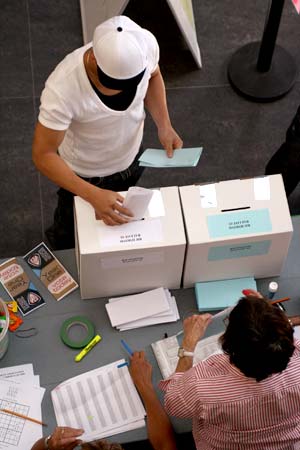
A Kwantlen student submits his referendum ballots. Volunteers were on hand to direct students towards the voting area. (Mitch Thompson photo)
Old issues between the Kwantlen Student Association and the Canadian Federation of Students have been brought back to the forefront in this week’s fee referendum.
The referendum, which runs from Sept. 21 to 24, concerns a number of proposed new fees to be paid each semester.
The KSA is supporting most of them, writing in its pamphlets, “This is your chance to build Kwantlen’s future.â€
Some of the fees are aimed at improving existing services offered by the association, such as a 65-cent-a-credit fee to provide funds for student clubs and KSA-hosted events.
Other programs suggested are 13 cents a credit for the creation of a volunteer-run online radio, Radio Free Kwantlen and a $2.50 fee per credit to aid in the creation of new student union spaces.
“We want to help the university make the transition from a university-college, to a university,†said Richmond campus director for the KSA, Reena Bali.
“A lot of the questions that are proposed, we don’t have the funding to do it without increasing the fees.â€
But the KSA is certain that these programs would be worth the added cost.
“The event [proposal] is really good because it gives us a chance to work with the school, and throw correlated events,†said Bali. “If students come in and say, ‘We want this type of event,’ we have the funding to do so.â€
Bali also supports the Students Taking an Active Role Together, or START, program, which offers volunteer opportunities to students, as well as free or discounted job-related training, such as first aid or Food Safe.
However, one question on the referendum, question 11, doesn’t deal with new programs, but rather an increase in the membership fee to belong to the Canadian Federation of Students.
The $1.78 increase doesn’t sit well with the KSA, which says that it has been directed to up the cost by the CFS’s “three separate legal entities.â€
The issue is over why the increase is needed, and what it will be used for.
“I’ve gone to two CFS meetings and they’ve never discussed it publicly in the meetings. When you do try to question them in budget, they do not answer your questions, or they say you do not have speaking rights,†said Bali.
Instead of approving the increase without student consultation, the KSA has decided to put it to vote.
“We believe students should decide whether it’s worth it to pay the Canadian Federation of Students more money than we do already,†said Bali.
Dave Molenhuis, the treasurer for the CFS, has a few criticisms of the referendum question.
“In the past, students at Kwantlen voted and have voted since on continued membership to belong to the Canadian Federation of Students, and at that time voted on the basis that there would be a membership fee,†he said.
The membership fee is set at a national general meeting of all CFS members, including the KSA.
“The premise of the question that’s being asked is that the CFS has directed the KSA to do ‘X,’ when in fact the student unions resolved to do this at a federation meeting.â€
The 2009/2010 fee is $3.99 for CFS membership and services, as well as a $3.99 fee at the provincial level. This is then adjusted for inflation using the Canadian consumer price index.
Molenhuis said that this year’s fee is equal to last year’s, and the adjustment for inflation doesn’t equal $1.78.
He doesn’t see where the KSA’s increase is coming from.
As to the stonewalling of KSA delegates looking for information on what the fees are used for, Molehuis is also skeptical.
“I haven’t been asked by the director at the Richmond campus for any information. All the documents, by-laws, constitutions, are housed in the offices of the student associations,†he said.
He also explained how the money is used.
“The fees are spent on anything from campaigns to the preparation and production of research, to travel for students to participate in lobbying sessions,†he said.
The animosity between the two organizations is not new. In 2008, the KSA held a referendum asking students if they wanted to leave the CFS: 56 per cent of Kwantlen students voted to stay.
These referendum questions could be foreshadowing another showdown.
“Last time it was pretty close,†said Bali. “We do have a petition asking students if they want to defederate.â€
Regardless of association politics, Bali and the KSA hope that Kwantlen students take the time to cast their ballot.
“I would hope that all students would vote. The only way we can operate properly as a society is to come out and vote,†said Bali.


